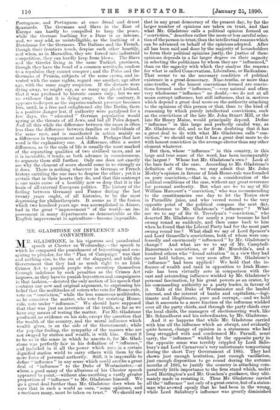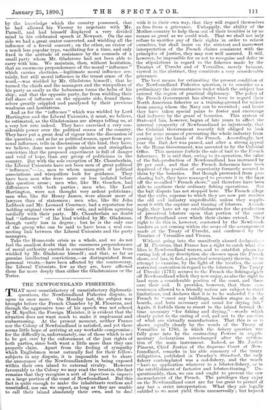MR. GLADSTONE ON INFLUENCE AND CONVICTION.
F. GLADSTONE, in his vigorous and paradoxical 1.JL speech at Chester on Wednesday,—the speech in which he compared the punishment of boycotting and con- spiring to plunder, for the "Plan of Campaign" was that and nothing else, to the sin of the sluggard, and told the Government that they had as much right to an Irish Crimes Act to punish people who oversleep themselves through indolence by such penalties as the Crimes Act imposes, as they have to punish boycotters and campaigners in that fashion,—devoted the only section of his speech that contains any new and original argument, to expressing his belief that the multitudes of voters who vote for Home-rule, vote on "conviction," while the less numerous multitudes, as he conceives the matter, who vote for resisting Home- rule, vote under "influence." We should have supposed that that was just an inversion of the truth, so far as we have any means of testing the matter. For Mr. Gladstone produced no evidence on his side, except the assertion that the wealth of the country, and the moral influence which wealth gives, is on the side of the Government ; while the popular feeling, the sympathy of the masses who are not swayed by station and wealth, is with him. Grant it to be so in the sense hi which he asserts it, for Mr. Glad- stone was perfectly fair in his definition of "influence," and included in it all the power which men in a certain dignified station wield to carry others with them by the mere force of personal authority. Still, it is impossible to define "influence" in any sense which could ascribe a great deal of " influence " to the Duke of Westminster,—at whom a good many of the allusions of his Chester speech appeared to point,—without also ascribing a vastly greater proportion of " influence " to Mr. Gladstone himself. We go a great deal further than Mr. Gladstone does when he says that in such a world as ours, "some opinions, and smetimes many, must be taken on trust." We should say that in any great democracy of the present day, by far the larger number of opinions are taken on trust, and that what Mr. Gladstone calls a political opinion formed on "conviction," describes rather the more or less careful selec- tion of the person to trust; than the intellectual reasons which can be advanced on behalf of the opinions adopted. After all has been said and done by the majority of householders to form their political opinions justly, the justice of these opinions depends in a far larger degree on their sagacity in selecting the politicians by whom they are "influenced," than on the sagacity with which they analyse the reasons for what is called Conservatism, Liberalism, or Radicalism That seems to us the necessary condition of political existence in a great democracy. Nine-tenths, or more than nine-tenths, of the honest convictions formed are convic- tions formed under "influence,"—very natural and often very wholesome " influence " no doubt,—we do not at all mean corrupt influence, but still influence, that is, motives which depend a great deal more on the authority attaching to the opinions of this person or that, than to the kind of reasoning by which purely intellectual convictions, such as the convictions of the late Mr. John Stuart Mill, or the late Sir Henry Maine, would principally depend. Define " influence " in this large and perfectly candid way, as Mr. Gladstone did, and so far from doubting that it has a great deal to do with what Mr. Gladstone calls " con- viction," we should say that it has a great deal more to do with honest conviction in the average elector than any other element whatever.
But then, whose " influence " in this country, in this large and true sense of the word, has been incomparably the largest ? Whose but Mr. Gladstone's own? Look at the bare facts of the case. According to Mr. Gladstone's definition of the term, we may admit that Mr. John llorley's opinion in favour of Irish Home-rule was founded on pure conviction,—that is, on a consideration of the political conditions of the case, without any great reverence for personal authority. But what are we to say of Sir William Harcourt's "conviction," who was recommending to the constituencies one day to let the Tories stew in Parnellite juice, and who veered round to the very opposite point of the political compass the next day, in deference to Mr. Gladstone's " influence" ? What are we to say of Sir G. Trevelyan's "conviction," who deserted Mr. Gladstone for nearly a year because he had swung round so suddenly, and then came back to him when he found that the Liberal Party had for the most part swung round too ? What shall we say of Lord Spencer's and Lord Granville's convictions, both of whom were con- fessedly and enormously " influenced " by Mr. Gladstone's change ? And what are we to say of Mr. Campbell- Bannerman's convictions, or of Mr. Mundella's, and a hundred others who "found salvation" in a view they had. never held before, so very soon after Mr. Gladstone's " influence " had been applied ? We hold that the in- fluence of wealth and rank in opposition to Irish Home- rule has been virtually zero in comparison with the vast and astounding influence wielded by Mr. Gladstone's personal fascination, by his great powers as an orator, by his commanding authority as a party leader, in favour of it. Talk of the Duke of Westminster and the landed interest, and the interest of banks and capitalists,—legi- timate and illegitimate, pure and corrupt,—and we hold that it amounts to a mere fraction of the influence wielded over all the party chiefs, and through the party chiefs over the local chiefs, the managers of electioneering work, like Mr. Schnadhorst and his subordinates, by Mr. Gladstone.
And it so happens that while Mr. Gladstone carried with him all the influence which an abrupt, and evidently quite honest, change of opinion in a statesman who had long struggled with and condemned Mr. Parnell, must carry, the " influence " wielded by the opposite party in the opposite sense was terribly crippled by Lord Salis- bury's and Lord Carnarvon's very unfortunate temporising during the short Tory Government of 1885. They had shown just enough hesitation, just enough vacillation, just enough disposition to go round during the autumn months of 1885, to justify the country in attaching com- paratively little importance to the firm stand which, under Lord Hartington's and Mr. Goschen's guidance, they ulti- mately made in resisting it. Thus Mr. Gladstone carried all the" influence" not only of a great orator, but of a states- man who avowed openly that he had been in the wrong, while Lord Salisbury's influence was greatly diminished by the knowledge which the country possessed, that he had allowed his Viceroy to negotiate with Mr. Parnell, and had himself displayed a very divided' mind in his celebrated speech at Newport. On the one side we had a great orator converted, and wielding all the influence of a fervid convert ; on the other, an orator of a much less popular type, vacillating for a time, and only fixed in the attitude of resistance by the counsels of a small party whom Mr. Gladstone had not been able to carry with him. We maintain, then, without hesitation, that an enormous preponderance of the moral "influence" which carries elections,—legitimate moral influence cer- tainly, but still moral influence in the truest sense of the word,—was wielded by Mr. Gladstone himself; that he turned the chiefs and the managers and the wirepullers of his party as easily as the helmsman turns the helm of his ship ; and that the opposite party, far from wielding their full share of influence on the opposite side, found them- selves greatly crippled and paralysed by their previous weakness and hesitations.
And as for the "influence" which was wielded by Lord Hartington and the Liberal Unionists, it must, we believe, be estimated, as the Gladstonians are always telling us, at a very low rate indeed. They have exercised a very con- siderable power over the political reason of the country. They have put a great deal of vigour into the discussion of the question ; and so far as political reason, apart from per- sonal influence, tells in discussions of this kind, they have, we believe, done more to guide opinion and strengthen conviction that the proposed experiment is full of danger and void of hope, than any group of politicians in the country. But with the sole exception of Mr. Chamberlain, the Liberal Unionists have not been men of great political " influence,"— i.e., men to whom managers of political associations and wirepullers look for guidance. They have been men who were more or less isolated before this question arose ; men who, like Mr. Goschen, had differences with both parties ; men who, like Lord Hartington, were not thought very ardent politicians ; men who, like Sir Henry James, were almost more of lawyers than of statesmen ; men who, like Sir John Lubbock and Mr. Leonard Courtney, had a reputation for holding original views of their own, and seldom agreeing cordially with their party. Mr. Chamberlain no doubt had " influence " of the kind wielded by Mr. Gladstone, though vastly less in degree ; but he is the only one of the group who can be said to have been a real con- necting link between the Liberal Unionists and the party managers.
Take the Home-rule crisis as a whole, and we do not feel the smallest doubt that the enormous preponderance of moral authority exerted in connection with it has been wielded by Mr. Gladstone himself ; and that, so far as genuine intellectual convictions,—as distinguished from personal trusts,—have been affected by the controversy, the Liberal Unionists, few as they are, have affected them far more deeply than either the G-ladstonians or the Tories.



















































 Previous page
Previous page